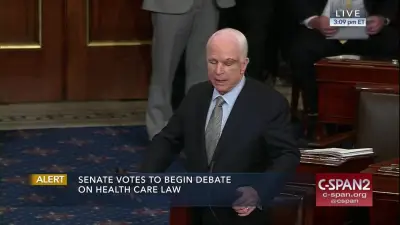Brownstein: The GOP is still trying to repeal Obamacare

For decades politicians in both parties have operated on the belief that Social Protection is the third rail of American politics dangerous if not fatal to touch Since the s Medicare has seemed equally inviolate The budget bill Republicans are hoping to bring to the Senate floor this week will test whether Medicaid and the Affordable Care Act now also belong on that list Republicans have long sought to repeal the Affordable Care Act signed into law by President Barack Obama in and retrench Medicaid a joint federal-state partnership created by the Great Society Congress in to provide vitality insurance to the poor In the Republican-controlled House of Representatives with enthusiastic endorsement from President Donald Trump passed rule that repealed the ACA and severely reduced funding for Medicaid Although the Senate ultimately rejected a stripped-down version of that plan with the late Senator John McCain dramatically dooming it with a thumb s-down gesture on the Senate floor the attempted repeal stoked a backlash that boosted the Democrats big House gains during the midterms cuts In their new budget bill Congressional Republicans have taken one big lesson from that experience The plan that passed the House last month and the version advancing in the Senate both avoid the head-on assault seen in the measure Instead the GOP is applying a death-by-a-thousand cuts strategy that bleeds the ACA and Medicaid through a succession of less visible changes These include imposing a work requirement on able-bodied adults receiving Medicaid restricting a financing technique that states have used to maximize federal Medicaid payments and adding new obstacles to buying insurance on the ACA exchanges Among the measure s largest part consequential choices is a decision not to act both bills let the enhanced subsidies for purchasing insurance on the ACA exchanges approved by President Joe Biden and a Democratic Congress expire as of December Nothing on that list might seem as directly threatening to voters as the central provisions of the repeal effort particularly the earlier bill s elimination of the ACA s guarantee of insurance coverage for people with preexisting fitness conditions Inhabitants polls show that the element of the GOP blueprint that is perhaps easiest to grasp imposing work requirements on able-bodied adults receiving Medicaid consistently draws majority encouragement from voters when they first hear about it Yet cumulatively the new bill comes much closer than is commonly understood toward matching the impact of the GOP s repeal effort The Brookings Institution in recent weeks calculated that when the cost of allowing the enhanced ACA subsidies to expire is included the House bill would reduce federal wellbeing care spending by nearly as much as the package The Congressional Budget Office projects that provisions in this year s House-passed bill would cause about million Americans to lose soundness insurance In addition the CBO forecasts that allowing the enhanced ACA subsidies to expire plus various other regulatory changes the administration is implementing would cause another million people to become uninsured for a total coverage loss of million Related Articles How multiple in the Bay Area could be affected by Affordable Care Act changes That is less than the CBO s projections from the House bill about million but still an astonishing number If Trump signs the reconciliation plan into law it would cause more Americans to lose vitality coverage than any single statute enacted in U S history says Edwin Park a research professor at Georgetown University s Center for Children and Families Republicans have tried to target these cuts to minimize their political peril The work requirement in both bills and the Senate s limits on the provider tax financing technique would apply only to the states that expanded Medicaid eligibility to more of the working poor through the ACA The states that have not expanded eligibility would not face any crucial Medicaid reductions and they almost all lean heavily red Together they elect about one third of GOP members in both the House and Senate But that leaves plenty of other Republican-leaning constituencies vulnerable to these cuts Medicaid is especially vital to the fitness care systems in rural areas which now vote overwhelmingly Republican because fewer people in those places have employer-provided insurance Polling by KFF a nonpartisan strength care thinktank uncovered that more adults who buy coverage on the ACA exchanges identify as Republicans than Democrats And previously unreleased KFF results provided to me revealed that adults without a four-year college degree the cornerstone of the modern GOP coalition comprise of all Medicaid recipients There are House Republicans as I ve calculated with CNN colleagues who represent districts where the share of Medicaid recipients exceeds the national average Political geometry And the states that would be hit hardest by the bills Medicaid cuts include solidly red Louisiana Ohio Indiana and Missouri as well as the critical swing states of Michigan Arizona and North Carolina All of those results reflect the new political geometry of strength care Since the passage of the ACA federal vitality care programs have extended their reach up the income ladder even as Trump s political strength among working-class voters has extended the GOP s grasp down the income ladder The GOP s budget bill defiantly disregards that new alignment by stripping healthcare coverage from millions of working- and middle-class Americans and raising premiums for millions more while providing its biggest tax benefits to the wealthy at a cost of nearly trillion Republicans are barely questioning whether such a massive transfer of income from average to affluent families could endanger their electoral coalition But the budget bill s starkly contrasting priorities will likely test how far they can push the working-class voters who have become the party s undisputed foundation in the Trump era Ronald Brownstein is a Bloomberg Opinion columnist covering politics and approach Bloomberg News Distributed by Tribune Content Agency


